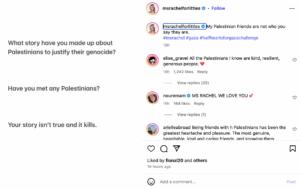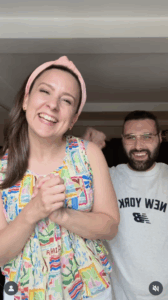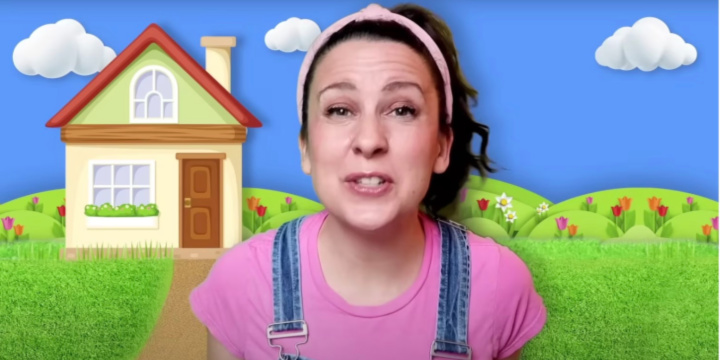Ms. Rachel. Photo: YouTube Screenshot.
Rachel Griffin-Accurso is a familiar face in millions of American households.
The 42-year-old YouTube star has more than 16 million subscribers, and one of her most-watched videos has clocked over 1.5 billion views – more than the entire population of China. She’s a powerhouse in the children’s educational entertainment sector and a multi-million-dollar brand, with a personal net worth estimated above $10 million.
To her legions of tiny viewers—most under the age of three—she’s simply Ms. Rachel: dungaree-clad, with a friendly sing-song voice and catchy tunes designed to help toddlers learn their first words. Parents are assured by her “Toddler Learning Videos” channel, where the content uses “techniques recommended by speech therapists and early childhood experts” to help children meet key milestones. Ms. Rachel promises “interactive, high-quality screen time” that parents can trust.
But in recent months, Griffin-Accurso has become just as vocal about the war in Gaza as she is about nursery rhymes – pushing what she calls her “advocacy for Palestinian children” to her 3.6 million Instagram followers and beyond.
Her posts have accused Israel of “genocide,” amplified the infamous and debunked image of a supposedly “starving” Palestinian child (later revealed to suffer from a congenital condition), and promoted the work of her “friend” Motaz Azaiza – a Palestinian photojournalist who has called for “resistance” following Hamas’ October 2023 massacre, refused to condemn the slaughter of Israeli civilians, and praised eliminated Hamas leader Yahya Sinwar.


Despite this, Ms. Rachel has been showered with glowing media coverage, with headlines framing her stance as brave and selfless: “Ms. Rachel says she’ll risk career to advocate for children in Gaza” and “Ms. Rachel says she won’t work with anyone who hasn’t spoken out about Gaza.”
In reality, a pro-Palestinian, anti-Israel stance is hardly career suicide in the entertainment industry – it’s the prevailing view.
Advocacy or Misplaced, Selective Outrage?
Amid the praise, there has been pushback from those who have noted her repeated sharing of misinformation and her decision to platform a figure who defends the worst massacre of Jews since the Holocaust.
She has brushed off such criticism, telling anti-Israel journalist Mehdi Hasan on his news site Zeteo that it’s “sad” that people “make it controversial when you speak out for children that are facing immeasurable suffering.” Asked why she speaks up for Gaza’s children, she replied: “Silence wasn’t a choice for me.”
In an interview with CNN’s Christiane Amanpour, Griffin-Accurso admitted she is “not an expert” on Israel or Gaza, but said her background as an “expert in child development” made her “know that what I was seeing was wrong.”
Only after taking such a strong public stance on Gaza did she begin highlighting children in other conflict zones. In May 2024, she launched a fundraiser through Save the Children for Gaza, Sudan, the Democratic Republic of Congo, Ukraine, and other war-affected areas, offering personalized video messages in exchange for donations. Even so, the overwhelming majority of her posts about global crises remain focused on Gaza.
She has posted occasionally about Sudan’s famine, the world’s most extreme hunger crisis, which has killed tens of thousands and displaced 13 million. She’s also referenced Haiti’s spiraling violence, which has left half the country facing food insecurity.
Yet both crises—Sudan’s civil war (since April 2023) and Haiti’s collapse (since 2020)—predate the Gaza war. And until Hamas’ October 7 massacre and Israel’s subsequent campaign to dismantle the terror group and release the hostages held by the terrorist group, Ms. Rachel had not spoken about them at all. They seem, frankly, an afterthought.
Where Does Ms. Rachel’s “Pro-Palestinian” Advocacy Lead?
It is troubling enough that one of the most influential figures in early childhood education feels compelled to take a public stand on a complex geopolitical conflict she concedes she does not understand in depth.
It is more troubling that she has repeatedly spread falsehoods about it and lent her platform to a man who defended a massacre of civilians—including babies, children, and entire families—in their homes.
When someone with Ms. Rachel’s reach presents herself as a trusted educator while misinforming millions of parents about one of the most volatile conflicts in the world, the damage is not confined to the headlines. It shapes how the next generation will understand history, morality, and truth itself.
That is why it matters. Not because a children’s entertainer has political opinions – but because those opinions are wrapped in a brand that parents trust implicitly, and delivered to an audience too young to know the difference between fact and fiction.
If Ms. Rachel wants to be an advocate for children everywhere, she should start by committing to accuracy and condemning all atrocities, no matter the perpetrator.
The bottom line: Misinformation about Israel spreads fastest when it comes from unexpected sources – especially from figures trusted with children’s education, because their words carry an assumption of authority and moral responsibility. That’s why exposing it matters.
The author is a contributor to HonestReporting, a Jerusalem-based media watchdog with a focus on antisemitism and anti-Israel bias — where a version of this article first appeared.
Click this link for the original source of this article.
Author: Rachel O’Donoghue
This content is courtesy of, and owned and copyrighted by, https://www.algemeiner.com and its author. This content is made available by use of the public RSS feed offered by the host site and is used for educational purposes only. If you are the author or represent the host site and would like this content removed now and in the future, please contact USSANews.com using the email address in the Contact page found in the website menu.








